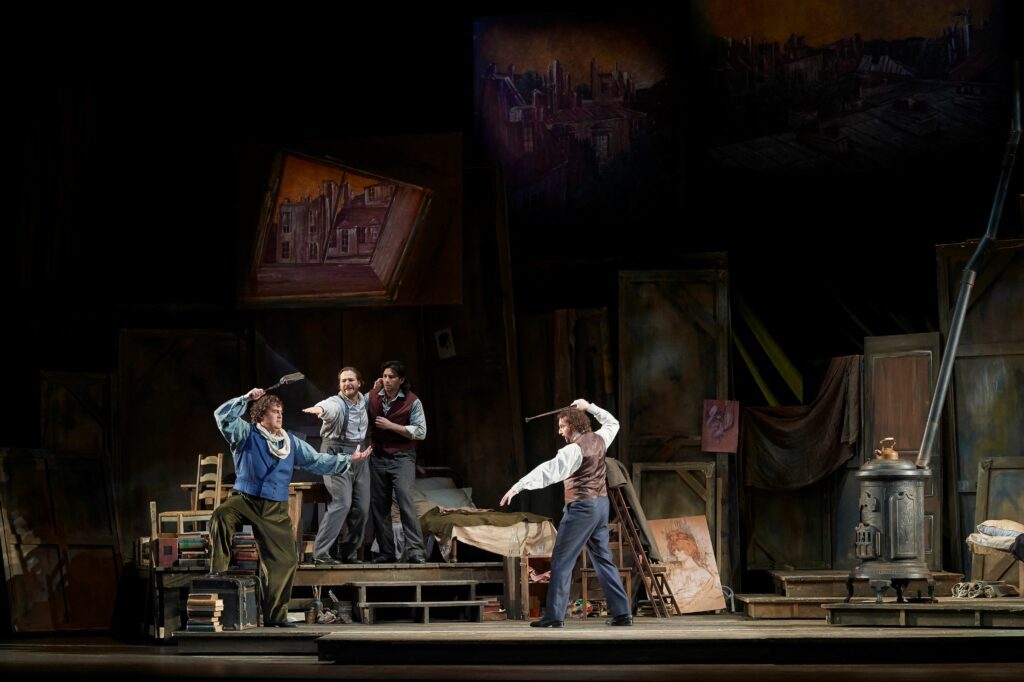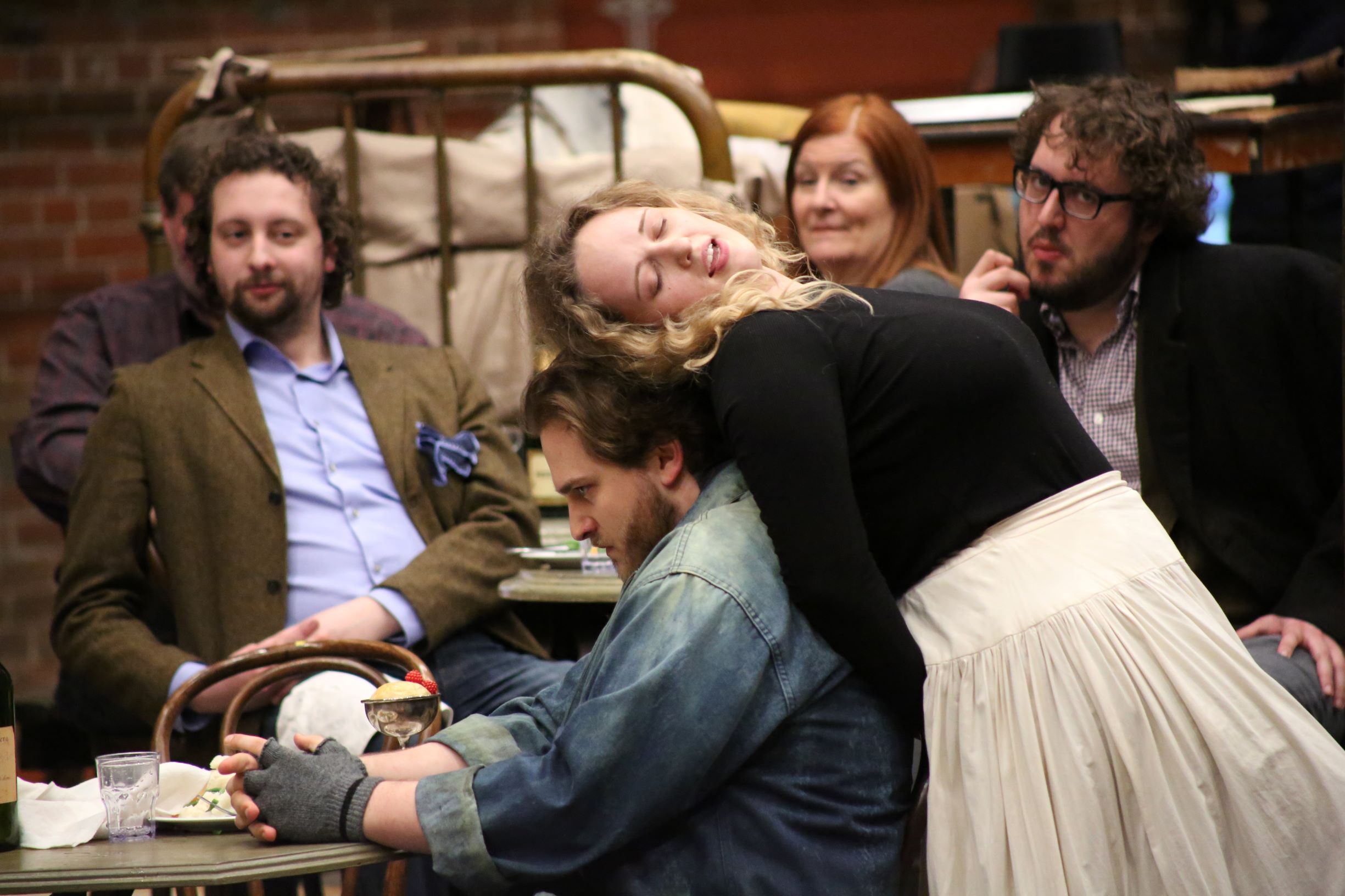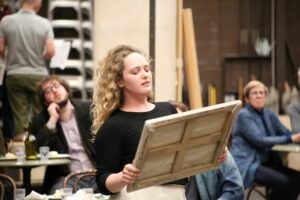Giacomo Puccini’s warhorse La Bohème is a tale about young artists’ whirlwind lives in the centre of the artistic world of 19th-century Paris. Audiences experience a window into their passion, ambition, and their poverty. Veiled behind Canadian Opera Company’s (COC) production, are the lives of the young artists who play these roles. Often, their struggles and hopes mirror those of their onstage counterparts—Schaunard, Mimì, Rodolfo and the others.
Toronto can be an unreasonably expensive city for young opera singers. Most find themselves dueling with the treachery of ever-rising housing costs. That’s why baritone Joel Allison, who plays Schaunard, says he can relate to the opening scene of the opera. In it, the ‘starving’ artists’ landlord visits their apartment, demanding rent money from a group of friends just trying to enjoy a pleasant evening. “The cost of housing [is] the biggest part of my paycheque and that just goes up every year,” Allison says. This harsh reality often requires performers to take work outside of music to make ends meet. Compounded with the pressure of physically demanding six-hour rehearsals, an additional retail or teaching job can be grueling.

(l-r) Önay Köse (Colline), Andrzej Filończyk (Marcello), Joshua Guerrero (Rodolfo) & Joel Allison (Schaunard) in Canadian Opera Company’s La Bohème. Photo: Michael Cooper
So, as much as Allison enjoys a nice dinner out with his wife, a flautist, they rarely have the resources to do so. They rarely even have a coinciding day off. This is another aspect in which Allison feels connected to his character. “When he has the money, [Schaunard] is like ‘okay, let’s go out and spend a little bit, have a nice dinner.’ At the end of Act II, the bill comes and he’s like ‘woah it’s this much?,’” Allison says, “I’ve definitely had that experience a couple of times.”
“the cost of housing [is] the biggest part of my paycheque and that just goes up every year”
It’s not all bad, though. Allison says he can relate to the camaraderie of the friends in La Bohème, as well. He has found a similar sense of fellowship among the world of Torontonian performers. Many of them have found their own ways around the challenges of living and working in a big city with high costs and cutthroat competition. The COC Ensemble Studio’s group chat is constantly buzzing with little pieces of advice and recommendations shared back and forth—receiving a message like “Nuts are 15% off at Bulk Barn with this coupon!!!” is not uncommon, says Allison.
Coming from rural Saskatchewan, soprano Danika Lorèn makes life in a city with three million people feel cozier by shopping locally. “Invest in local designers,” Lorèn says, “Make that part of your community as much as the musical side of it because people will want to support you as much as you want to support them. There can be a lot of opportunity that isn’t necessarily monetary exchange but can be really helpful.”
Even so, Lorèn, who will play Musetta, has had to become self-sufficient. “I have worked on skills that can save me money, like sewing and crafty things that make my life seem a lot more glamorous than it is,” Lorèn says. This has included designing her own website and self-taught “gown flipping”. Lorèn adds material or embroidery to a gown she’s already worn to make it seem new. She says she most relates to Mimì’s character: “She’s trying to make it in Paris—a small town girl in a big city trying to make a creative career work. And I’m just a hopeless romantic, too.”
“I have worked on skills that… make my life seem a lot more glamorous than it is”

(Clockwise) Brandon Cedel (Colline), Lucas Meachem (Marcello), Phillip Addis (Schaunard) & Atalla Ayan (Rodolfo) in rehearsal for Canadian Opera Company’s La Bohème. Photo: COC
One thing that young singers agree on is the importance of an escape from their work, but that looks different for everyone. Bass-baritone Brandon Cedel, who sings Colline says, “It’s very, very easy to get caught up in the world of opera but it’s important to leave work every now and then. It’s strange because what we do, it’s our job but it’s also our hobby. And our passion.”
Cedel continues, “What I’ve found helpful is finding the balance between opera life and ‘Brandon life.’” For Cedel, a new favourite escape is skateboarding. Self-admittedly, his skills on the stage are more impressive than on the board. For Allison, that escape is watching winter sports and curating a meticulous home garden of herbs and flowers for his two pet bunnies. For Lorèn, it’s hot yoga.

A scene from Canadian Opera Company’s La Bohème featuring Danika Lorèn (Musetta) in pink. Photo: Michael Cooper
Despite the hardships of living in the heart of a big city, that is where the opportunities are. That is where the art is. Opera singers are drawn to it like a moth to a flame, the way young artists have been for all of history. This is why La Bohème is timeless. “Toronto right now is at such a point of artistic growth that we could compare living here to Paris in the time of La Bohème,” Lorèn says. “The more art we create here and the more we own Canadian classical music, it’ll only make opera more accessible and everyone part of the art form.”










